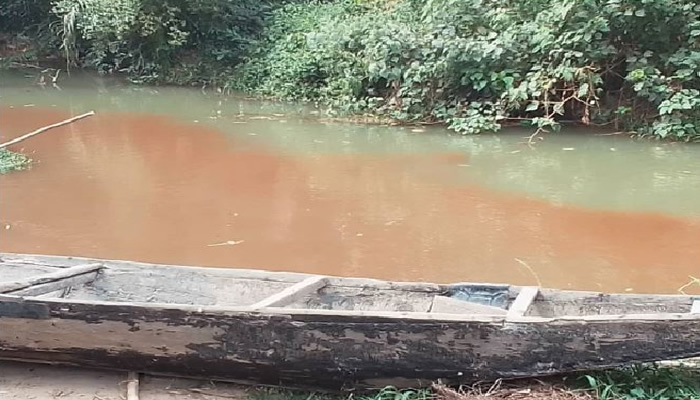
SUNDAY NWAKANMA writes about the contamination of the Aro Ajatakiri stream in the Ikwuano Local Government Area of Abia State and how it has affected the livelihoods of residents of the community
The appearance of the Aro Ajatakiri stream jolted residents of the Aro Ajatakiri in Ajatanaigu Autonomous Community in Ikwuano Local Government Area of Abia State, who arrived at the stream in the morning of Wednesday, January 24, to carry out their businesses.
Many of the villagers could not fathom why their primary source of water looked like the River Nile after the biblical Moses struck it with his staff, turning it into blood according to God’s instruction. The once thriving water body that not only provided the residents with different species of fish for trading and consumption but was also used for cooking had been poisoned.
A group of sand excavators who were the first to arrive at the stream raised the alarm that rattled the community to the discovery that the stream had been contaminated.
While some of the fish were struggling to find their way out of the stream, others were found dead along the bank. The excavators said though the stream was usually brownish in the rainy season, it often had a clear appearance in the dry season.
Worried by what looked like a mysterious occurrence and the palpable fear among the residents, the head of Ezuma village of the Aro Ajatakiri community, Chief Godwin Nwosu quickly, sent an SOS to the Ministry of Environment.
“We woke up on Wednesday and saw the river polluted and in a mess. It happened Tuesday night. The condition of the stream was very bad. The river became reddish and smelly and all the aquatic animals were killed.
“The stream was unfit for human consumption, no human being could stay there. Nobody has any health problems as we gave a matching order restraining the community from even stepping into the stream and I thank the Commissioner for Environment for his prompt action,” Chief Nwosu told Sunday PUNCH.
The village head said the contamination of the stream was a call to the state government to come to the aid of the community which he said was in dire need of government presence and development.
“When he (Commissioner for Environment) saw the video clip, he reacted immediately. He went on air and asked the community to keep off and we obeyed.
“This has happened before and all our cries to the state government were not heeded to. Our lives are in danger. We are suffering here and there is no government presence. “All we have here is through self-help.
“Let the government come with special medical palliatives as well as food palliatives as some people, especially ignorant sand excavators who are from the community, Akwa Ibom, Ohafia, and Item, among others, came into contact with the water and others inhaled it. Many community men are fishers and this has affected their businesses,” he added.
Community in dire need of govt presence
Situated about 20 kilometres from the Umuahia metropolis, the community can be assessed through the Mbubo community in the Isialangwa South Local Government Area of the state, through the Umuahia- Aba New Road or Ndoro, along the Umuahia-Ikot Ekpene Road.
It was also learnt that the community lacks modern amenities, including pipe-borne water, steady power supply, and quality access roads, particularly during the rainy season.
Life is sustained in the community through agrarian activities and sand escalation from the only stream that also serves as the main source of drinking water and for other domestic uses.
The bridge across the stream was alleged to have been built by the community after the Nigerian Civil War in 1970 with iron materials sourced from the military.
Our correspondent gathered that though no life had been lost to the contamination of the stream, businesses and livelihoods were affected as many of the residents survived through fishing and sand excavation.
When Sunday PUNCH visited the community, some sand excavators were seen at the stream.
A dump site owner, Ugochuwu Otti, said the colouration lasted for four days, “only settled at the bed of the stream but spread to other parts when stirred”.
When stirred, our correspondent observed that the stream turned black and quickly turned reddish brown, and took hours to settle.
“Since then, nobody has been entering into the stream or using it for consumption, but thank God, there have not been any casualties,” Otti said.
He also lamented that the stream had lost all its aquatic life, including crocodiles, alligators, and fishes, among others.
According to him, the source of the contamination could not be traced.
Women bearing brunt of poisoned stream
A woman leader in the community, Cecilia Okoro, said women had been subjected to hardship since the stream was rendered useless by the poisoning.
“The water from the stream is no longer good for cooking, not to mention drinking. Women are the most users of water and we are faced with water shortage, except for those that have boreholes and who ration it to others. All women have kept away from the stream.
“We have cried out for the world to hear. They should come to our rescue as we have not seen such before in our life as a community,” Okoro said.
Also speaking, a health officer in charge of Aro Ajatakiri Health Centre, the only health facility in the community, Chinonyerem Josiah, urged parents to discourage their children from bathing in the river to prevent an outbreak of diseases.
She also appealed to the state government to assist the centre with drugs to contain any possible outbreak.
Govt begins probe
In a bid to prevent an outbreak of diseases, the state government called on residents of the community to steer clear of the river, pending the outcome of an investigation.
The Commissioner for Environment, Philemon Ogbonna, in a statement, said the government was aware of the incident and was working to unravel the circumstances surrounding it.
“In furtherance of this report of the above-stated health hazard, the Ministry of Environment, Abia State, wishes to inform the members of the said community and the general public to desist henceforth from making further use of the community stream, pending the investigation and feasibility study of the stream and its area which is currently being carried out by the state Ministry of Environment.”
However, the traditional ruler of Ajatanaigu Autonomous Community, and Onyeoruru I of Ajatanigu, Larry Agwu, dismissed the claim that the contamination could have come from some factories in Umuahia.
“The government said it (the contamination) is chemical waste from some factories in Umuahia. It is not,” he said.
He explained that the source of the Aro Ajatakiri stream was from Aba Road in Umuahia and ran through Aro Ajatakiri, Olokoro in Umuahia South to Amaba in the Ikwuano Local Government Area to Nnonno, Ahuwa, Umuigwu, Ntalakwu, Oloko and Nchara communities, all in Ikwuano, before emptying in Akwa Ibom.
According to Agwu, the contamination must have occurred at Ajatakiri as it did not affect the sections of the stream in other communities
He also hinted that the pollution could have resulted from the use of Gammalin 20 by fishermen who were not from Abia as had been witnessed in the past.
“The perpetrators are not seen and the community would not know when they will come,” he lamented.
But speaking on the issue, the Commissioner for Environment said the government would not take a position on the matter until the investigation was concluded.
Ogbonna said, “Investigation is still on. We want to establish it. We don’t want to base it on suspicion. The team investigating it is already doing that”.
“The (appearance of the) water changed to something else that is not what it used to be. The investigating team went there and interacted with the community who informed them that fish were dying in that stream and some fish ponds were affected.
“So, by that, the water has been contaminated and we are trying to establish the source of contamination and what is likely to be wastes from companies around. We want to be very meticulous in what we are doing to enable us to pin down the source of contamination based on proper investigation.”
The commissioner said a team of environmentalists had visited the area and cautioned members of the community to avoid the stream until investigations were concluded.
He also assured that those affected would be assisted by the state government.
A member of the investigating health team, who spoke on condition of anonymity but refused to open up on the findings when our correspondent approached them, said, “It is subject to ratification by our team head”.
But the senator representing Abia Central in the National Assembly, Col. Austin Akobundu (retd.), said he received a report that a large quantity of a chemical substance was deposited in the stream by unknown persons.
“As the senator representing Abia Central, I will do all to ensure that such a thing will not happen again in my senatorial district. The report I have attributed the ugly development to an alleged large quantity of Gammalin 20 deposited in the stream by unknown persons/company.
“I am seriously pained by this hideous development because it does not only negatively impact the health of the people concerned, but has a serious effect on their environment and living standard.
“To this end, I wish to assure them that I will interface with the Federal Ministry of Environment, Federal Ministry of Health and other relevant agencies to ensure a thorough investigation of the remote and immediate causes of the contamination, as well as the restoration of normalcy through appropriate decontamination processes,” he said in a statement he issued through his media aide, Uche Nwosu.
The lawmaker said though it was too early to apportion blame, it was necessary to plead with the community to exercise restraint in the conduct of further activities in the stream.
“I, therefore, use this forum to commend the state government for its timely intervention that stopped the villagers from further using the stream for domestic purposes. I also condole with the mayor of Ikwuano, the traditional ruler of Ajatanaigu Autonomous Community and all the people affected by this ugly incident and ask them to take heart while the relevant authorities do the needful.
“I also thank the Almighty God for ensuring that no life was lost as a result of the sad development,” Akobundu added.
Contaminated stream can cause cholera, typhoid – FMC MD
The Managing Director of the Federal Medical Centre, Umuahia, Prof Azubuike Onyebuchi, told Sunday PUNCH that consuming water or fish from the stream could lead to gastrointestinal disorders, including diarrhoea, cholera and typhoid.
He, therefore, urged relevant government authorities to provide modern boreholes to prevent the villagers from endangering their lives.
“Water contamination is dangerous. When taken, it can lead to serious diseases like diarrhoea, cholera, and typhoid, among others.
“Such water must be avoided and must not be used until clinically certified fit for human use,” Onyebuchi added.
Abia will reduce impact on affected residents – Gov
Meanwhile, Governor Alex Otti said an arrangement was being made to ensure that the Aro Ajatakiri community did not suffer due to the pollution of the stream.
“(An) Arrangement is being made to ensure that Aro Ajatakiri people have drinking water outside the contaminated stream. We will provide the Aro Ajatakiri community with every support to ensure we reduce the impact of the contamination,” the governor said.
Also, the wife of the governor, Mrs Priscila Otti, who had earlier visited the community with some relief items, promised to sink boreholes in the area through the Ministry of Women Affairs and Poverty Alleviation in partnership with the Mayor of Ikwuano to provide succour for the residents, pending the conclusion of investigations into the matter.





